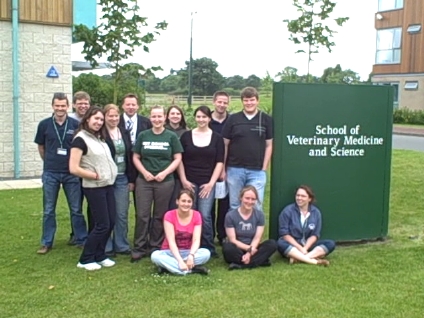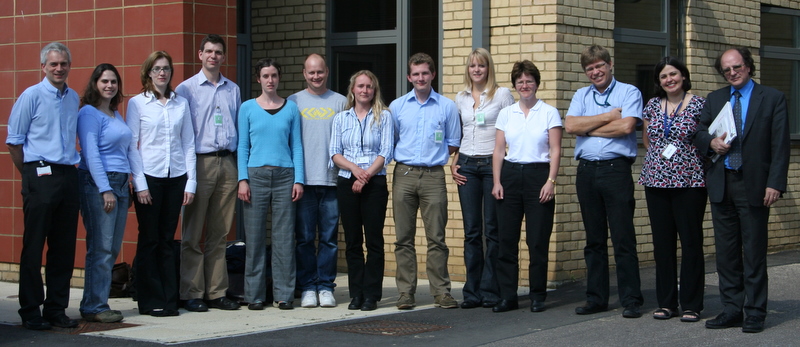Difference between revisions of "Introduction"
(No difference)
| |
Latest revision as of 12:22, 19 October 2011
WikiVet Community of Practice
The WikiVet Community of Practice was set up in July 2007 following funding from the HEA Centre for Medicine, Veterinary Medicine and Dentistry and from JISC (via the HEA). This wiki was initiated at the first workshop held on the 31st July 2007.
Who we are
Kim, Elisabeth, Linda, Tim, Sarah, Brian, Bara, Alex, Lizzie, Susan, Nick, Vicki and Alun outside the LIVE Centre, after the 1st WikiPath workshop on the 31st July 2007
Why we are doing this?
The WIKI VET Community of Practice has been established to explore the potential of second generation e-learning technologies building on existing collaborative partnerships between the UK veterinary schools. This new Community of Practice will enable academics and technical experts to work together in new ways on developing and sharing innovative e-learning resources.
This project grew out of existing collaborations between veterinary schools including the CLIVE and vetschools.ac.uk initiatives. Whilst these projects have been successful and widely used, there is now a need for the collaboration to evolve in parallel with the explosion of social networking tools such as wikis and blogs. Three of the schools have already taken the initiative in developing a collaborative wiki in the context of undergraduate and postgraduate Veterinary Pathology. The HEA funding will allow this model to be expanded in a more ambitious way to benefit all the UK veterinary schools.
Veterinary students and academic staff are familiar with e-learning as medium to supplement and complement traditional teaching and learning as part of a blended learning approach. However, with the rapid growth of material on the web, it has become increasingly difficult to find appropriate content which has been peer reviewed. This lack of signposting can result in students and staff wasting time searching for material or even chancing across second rate or incorrect information.
Emerging web technologies (sometimes referred to as Web 2.0) could offer a number of solutions to these problems. Crucially they provide a set of social networking tools which enable communities of practice to work effectively together on line. This will be used in the project to enhance existing face to face meetings and create new ways of working together. Wikis and folksonomies offer new ways for the community to order, index, signpost and rate digital content. This content could be in the form of text written collaboratively by the partner institutions or existing resources such as CAL, video, images, documents and Powerpoint (including some previously generated by the CLIVE and vetschools projects).
On a practical basis the project will utilise this wiki as the central framework for content development. It will adopt and extend the preliminary model already being trialled for the collaborative pathology wiki and extend its scope and user base. This work will be overseen by subject experts and enthusiasts who will employ students to help compile and develop the wiki. Good practice in communities of practice (emerging out of the JISC Emerge CoP project and from experience elsewhere) will be drawn upon for the effective functioning of this community.
The initial project steering group (representing Cambridge, Edinburgh and London veterinary schools as well as the LIVE Centre) currently meets on a virtual basis using Skype as a conference facility. However, occasional face to face meetings are also held for example at the AVRTW Conference or LIVE opening events. The intention is to expand the group to include the other UK veterinary schools (contacts at each of the schools have already been established).
Expected outcomes
• The establishment of a collaborative community of practice linking the UK vetschools with active and committed partners and full institutional support;
• Inter-institutional collaborative education and research projects based on the use of the Wiki Vet in veterinary education;
• Sharing expertise and good pedagogical practice between partner vetschools on the development and use of new e-learning technologies;
• Regular synchronous electronic discussions between steering group members as well as email lists and occasional face to face meetings;
• Building of cross institutional expertise and understanding of the pedagogy associated with the application of wikis and other web technologies in veterinary education;
• Enrichment of existing teaching resources and improved learning opportunities for students through the use of novel and contemporary web technologies
Workplan
Work with veterinary schools to discover what tools are in use and what aspects of CLIVE and VetSchools, supplemented by other technologies, would be the most use to them. The main focus in this phase will be on pathology resources but other areas identified will be logged as target areas for future projects; April – May 2007
- Analyse the tools available to assess where JISC services ‘add value’ and can be integrated meaningfully for staff and students; June – Sept 2007
- Set up wiki and media server at the University of London Computer Centre June 2007
- Host first student wiki authoring workshop July 2007
- Run a wiki showcase presentation for veterinary pathologists October 2007
- Pilot the sharing of pathology wiki content with other veterinary schools November 2007
- Upload Creative Commons veterinary educational resources onto server and provide links to wiki August 2007 – April 2008
- Work with all UK veterinary schools to raise awareness of the resources available including presentations and promotional material October 2007 – April 2008
- Evaluate the value of the resource and document the project for the benefit of the JISC April 2007 - April 2008
BSVP Meeting, Nottingham 2007
List of Delegates
- Dr Adrian Philbey, Dr Pamela Johnston, Mr James Baily, Mr Ahmed Mohamed Shoieb, Mr Sandy Bjornson, Ms Sophie Le Calvez, Mr Daren Hanshaw, Dr Richard Miller, Dr Irene McCandlish, Mr Alan Stevens, Dr Mark Obwolo, Dr Joyce Bass, Mrs Catherine Payne-Johnson, Ms Emma Rayner, Dr Christiane Krudewig, Dr Mark Stidworthy, Mr Bob Gumbrell, Linda Morrison, Mr Bruce Wilson, Dr Ross Harley, Mrs Jacki House, Ms Kate Hughes, Dr Sandra Schoeniger, Ms Emma Scurrell, Mrs Jayne Harris, Ms Johanna Smith, Dr Tom Vicek, Mr Mark Wessels, Ms Ann Pocknell, Professor Brian Summers, Mr Kevin Isaacs, Mr Nick Woodger, Dr Ann Sharpe, Dr Sionagh Smith, Mr Ben Strugnell, Alun Williams, Dr Cheryl Scudamore, Mrs Jane Miller, Ms Sandra Dawson, Mrs Heather Ainsworth, Susan Rhind, Mr Sean Haugland, Dr Joe Cassidy, Mr Stephen Spencer, Mr Jonathan Williams, Kim Whittlestone, Nick Short, Bara Stanikova, Lizzie Slack, Sarah McFarland, Alex Morley, Dr Rob Duquette, Dr Julio Benavides Silvan, Gillian Brown, Elisabeth Bachynsky, Ken Smith, Professor Don Schlafer, Dr David Buxton, Ms Katherine Whitwell, Dr Tony Blunden, Dr Pete Brown, Tim Scase
Extending the Community of Practice
Nottingham workshop
On the 15th January 2008 a workshop is being held at Nottingham Veterinary School to begin the process of extending the WikiVet community of practice.
The aims of the workshop were threefold:
- To involve resident trainees in the creation/editing process
- To extend the subjects covered by the wiki
- To consider other learning activities / developments within the wiki
See:
Nottingham student workshop
A workshop will be held on the 28th June 2008 at Nottingham Veterinary School for students interested in working on WikiVet over the 2008 summer.

David Gardner, Naomi Ragsdell, Jo Hinsley, Richard Hammond, Stephanie Smith, Hannah Rowland, Caroyln Harvey-Myers, Asher Allison, Thomas Iveson, Natalie Brown, Bara Stanikova and Rachael Wallace
The aims of the workshop were threefold:
- To involve student authors in the creation/editing process of the wiki
- To explore the next phase of the project incorporating anatomy and physiology into WikiVet
- To build links between students in different vet schools as part of the Community of Practice
See:
Acknowledgements
A page containing information about who has been involved with the project in the past. Acknowledgements
---
